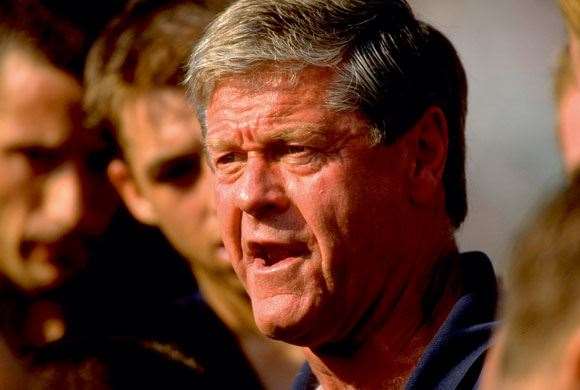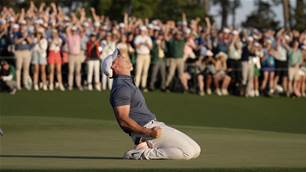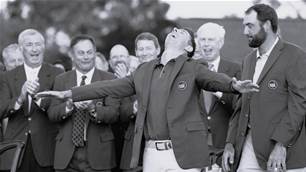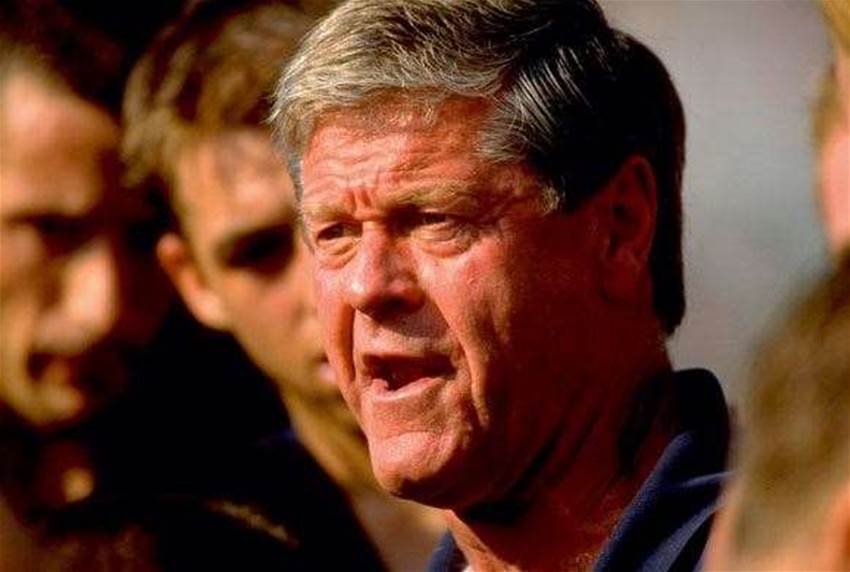David Parkin came from the most prestigious school ever to produce AFL coaches: the school of hard knocks. The backline.
David Parkin came from the most prestigious school ever to produce AFL coaches: the school of hard knocks. The backline. It’s still a mystery why defenders make grand coaches, but it probably has a lot to do with the fact the good ones know exactly how to make the most of their talent, and, from their defensive position, read the play superbly – they have to, if they are going to get and deprive hungry forwards of supply. Hence, coaches like Parkin, Hafey, Malthouse, Worsfold, Thompson and Sheedy – hard and cunning backmen – have been among the best.
 David Parkin, the non-coaching super-coach.
David Parkin, the non-coaching super-coach.If ever a coach deserved to be studied for just one season of football, it’s David Parkin. Few would hand over the reins almost entirely to their team even if they were shrewd enough to recognise that the time was exactly right. But that’s what Parkin did with the Carlton football team in 1995.Parkin was always a great coach. He’d won a premiership with Hawthorn in 1978 and two with Carlton in 1981-2 when he returned to the Blues for a second stint after an uncharacteristically unsuccessful term at the ailing Fitzroy club.
However, at the end of 1994, Parkin was certain he was about to be sacked. His team made a disastrous exit from the finals series and rumours were that the board had approached a number of high-profile ex-players for his job.Whether it was out of desperation, or the result of astute management, come the 1995 season, Parkin “stood down” as coach. Parkin figured that a team containing a burgeoning leadership group full of absolute champions didn’t need to be micro-managed.
Actually, being au fait with management theory, Parkin would’ve heard of self-managing, or self-directed, work teams. But to practise such principles with a football team, where the punishment for such a risk if it doesn’t come off is severe – especially at a historically unforgiving club like Carlton – was unprecedented.Parkin was a student of football. He knew that premierships were often won by the team with the least injuries, especially to key personnel. When 1995 began, he had a fit team brimming with talent. In 2003, he spoke to me briefly about that year. “The window lasts two to three years. We got there in ‘93 and thought we should win it. Then we went out in straight sets in ‘94. That was your window, then in ‘95 we hardly had an injury. The whole side stood up for the whole year, and they took over the whole show and I just stepped away.”
A more egotistical coach would’ve recognised this as a great time to grab some kudos. But Parkin beheld a team containing Kernahan, Silvagni, Koutoufides, Christou, Ratten, Williams and Madden, and figured they didn’t need to be told what to do. Recently, he said, “They picked the team, debriefed each other and did all the things commonplace in football today – and they were the first to do it. I can’t take any kudos other than appointing [psychologist] Anthony Stewart and delegating responsibility. It was the best education I’ve had in life or footy. If you’ve got a committed, experienced and confident group then you as leader have just got to give it over to them and trust them to do the job.” Of course, Parkin didn’t abrogate responsibility. He just managed the boundaries; the “big picture”.
Stephen Kernahan was captain. Rightly so. He was courageous and immensely influential. But leadership was never going to be an issue. “Leadership doesn’t mean captaincy – it means everybody getting on board and driving the show. Carlton’s leadership of 15 blokes ran the whole show.”Parkin concedes the team might not have been as talented as the sides he coached in 1981-82. But they were seasoned, had talent to burn and worked harder than any team he’d encountered.
Few business consultants can claim much “real world” success with such philosophies. In sport, probably the closest equivalent Parkin had was Ajax Amsterdam coach Rinus Michels, who built his “total football” around the talents of one man: Johan Cruyff.The Blues lost only two games for the entire 1995 season, before beating that hapless team of champions, Geelong, in the grand final by 61 points. Before Parkin came along, the concept of leadership “groups” had rarely been applied in AFL football – and when it has since, it often hasn’t worked. It takes more than theoretical knowledge.These days Parkin is a lecturer and corporate presenter and never ceases to impress as he relates his 1995 experience: the pure application, in the toughest of worlds, of the principles of true teamwork and empowerment.
‒ Robert Drane
Related Articles

Feature Story: Moving the Needle

The Aussies at The Open













